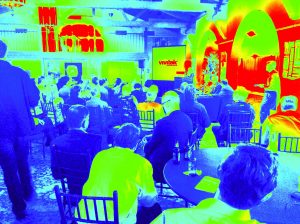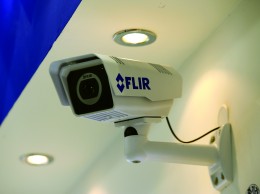
A thermal image of a group of entrepreneurs at the MIT Enterprise Forum on June 17 at the Cabrillo Pavilion Arts Center in Santa Barbara.
A rare packed house filled the Cabrillo Pavilion Arts Center Wednesday night for the MIT Enterprise Forum of the Central Coast.
The monthly event brings together businesses and technology experts to educate and inform entrepreneurs. Wednesday night, executives from Santa Barbra’s thermal imaging sector came together to inform entrepreneurs about the possibilities in thermal imaging.
Kevin Riley, former Teledyne Scientific Imaging president, said Santa Barbara has played an important role in the development of thermal cameras that can be traced back to World War II and Howard Hughes.
“Santa Barbara is the hub of infrared technology,” Riley said.
The industry is undergoing a radical change though, which presents opportunities for entrepreneurs and large companies alike. For decades, thermal imaging technology was used mostly by the military, and then slowly adopted by research centers. Producing thermal cameras was expensive and retailed for around $50,000 in the 1970s and early 1980s.
Bill Parrish, co-founder of Seek Thermal Inc., said the process of manufacturing the cameras used to involve cryogenic freezing, and that once that process was eliminated, it knocked $40,000 off the price of a camera.
Now, Parrish said, more thermal cameras are used for residential uses.
Arthur Stout, vice president of security for Flir Systems, said that the business model for thermal imaging companies is changing as companies sell more cameras to consumers.
“This is a significant time in this marketplace, as we transition from a business to government or business to business model to (a) business to consumer (model),” Stout said.
Despite the tremendous opportunities the technology holds, it can be tough to make the public aware of thermal cameras.
“One of the big challenges is awareness, Stout said.
“So, even though all of us here are in the industry or are immersed in it, there’s a big population out there that still does not fully understand the benefits of this technology. We’re out there through our brand efforts to change that and, hopefully, drive adoption.”






 Print
Print Email
Email

















